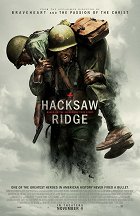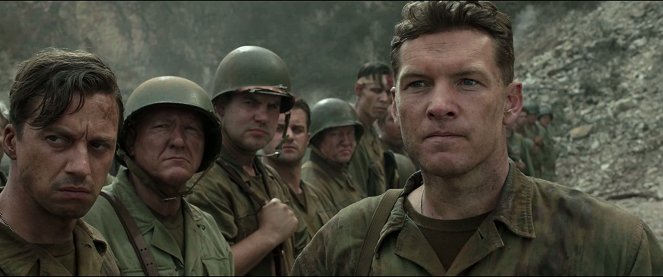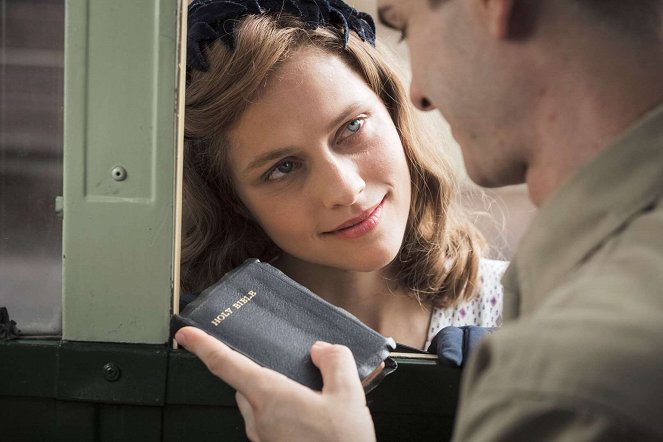Directed by:
Mel GibsonCinematography:
Simon DugganComposer:
Rupert Gregson-WilliamsCast:
Andrew Garfield, Vince Vaughn, Sam Worthington, Luke Bracey, Teresa Palmer, Hugo Weaving, Rachel Griffiths, Milo Gibson, Richard Roxburgh, Nathaniel Buzolic (more)Plots(1)
WWII American Army Medic Desmond T. Doss, who served during the Battle of Okinawa, refuses to kill people and becomes the first Conscientious Objector in American history to win the Congressional Medal of Honor. (official distributor synopsis)
Videos (18)
Reviews (16)
In the hands of Mel Gibson, the already fascinating story of Desmond Doss is transformed into a one hundred percent impressive anti-war film, which from beginning to end flows very naturally and without a single hiccup, or even cliché, and literally does whatever it wants with the viewer. In the first half, we follow Desmond's determination to enlist and wish him well in spite of everything and everyone. In the second half, we experience an extremely suggestive war hell with him and we don't understand what can make a man willingly throw himself into it (by the way, whoever says that the first half is for women and the second for men must have a really simple life). All the actors are great, the direction is imaginative, the script is not a quickie and I really liked the music. However, the Czech subtitle of the film "Zrození hrdiny" (The Birth of a Hero) is misleading, because heroism, which has many forms, is not so much at stake here. It's about conviction, courage, and belief that good things won't stop happening even in the worst place on earth.
()
If the child version of Andrew Garfield had been hit in the mouth with a brick at the beginning of Hacksaw Ridge instead of his movie brother, the whole film would have made a lot more sense. I wasn’t really sure how seriously I should take a young man with the face of a divine simpleton who isn’t overly familiar with how interpersonal relationships work, let alone international politics. In any case, the film takes him seriously enough to gradually lose all credibility. Instead, it offers an enormous dose of stupidity. It seems to me that the final Assumption scene wandered into the film from an unaired Monty Python sketch. The concept that forms the basis of the entire film is reminiscent of the theatre of the absurd. To make the hero of the biggest explosion of disembowelled guts and blown-off heads since Saving Private Ryan a very devout pacifist who rejects violence of any kind strikes me as a rather cruel irony. It doesn’t seem, however, that Mel Gibson is aware of that. He doesn’t use the scenes of slaughter (which soon become numbing rather than shocking) to lead Desmond to the realisation that war is a lot more hellish than he imagined it would be (in which case the contrast of the first and second halves of the film would have worked better), but to show how hard the boy will have it if he wants to survive longer than a split second without a rifle in his hand. The creation of a hero who rejects violence is thus paradoxically conditioned by pervasive violence. If his buddies had not been torn to pieces by the bullets and grenades of the savage Japanese (an ethnic stereotype that went out of fashion along with John Wayne), he could not have become a hero. I don’t doubt that someone else will find clear logic in what I myself see as an irreconcilable contradiction, but even if it didn’t seem to me that the film is ridiculous at its very core, I would have a hard time finding reasons to recommend it to anyone as an example of the best of what has been made in Hollywood this year. We have seen powerful and generally uncluttered depictions of the pandemonium of war many times before, and the clear narrative structure and textbook segmentation, thanks to which such films never even start to be boring, are qualities that have characterised American films for many decades. Hacksaw Ridge, however, is somewhat underdeveloped both intellectually and formalistically. 60%
()
The rumors that Hacksaw Ridge is a cruel carnage have been confirmed. At least the scene when the protagonists enter the battlefield for the first time is really not for the faint of heart and will probably be talked about for a while. How the film will fare overall, though, I can't say, but I'm afraid a lot of viewers won't be able to stomach this. Mel Gibson is a great director and it shows here not only in the battle scenes, where he allows himself to do some really wild stuff from time to time, but audiovisually overall. The trouble, however, may be that Hacksaw Ridge looks like something from the last century, and not from the 1990s. The hero is more naive and passionate about a good cause than Forrest Gump, the characters are downright shallow at times, and everything here is either black (Dobbs, you're a naive idiot and you're going to get your ass kicked) or white (Dobbs, we'll follow you to hell). Gibson was probably trying to do just that, and if you accept the rules of the game, you get a very good hero story that you may question how much it has to do with reality, but you will enjoy it. But if you don't tune in to the director's wave, you can suffer through Hacksaw Ridge. So watch out!
()
Nothing has changed in all these years, Mel Gibson is still a very good storyteller of romantic and personal stories and relationship lines, but only mediocre at working with war themes. We Were Soldiers (where he left the direction to his mate Randall Wallace) had identical ills and became a mere semi-cult classic for loyal fans rather than a benchmark of the genre. Not even Mel's appetite for blood and blown limbs can make up for it. All he had to do was invite Spielberg or Stallone in for a consultation to show him what the meaning of the word dynamic and imaginative action/war scenes is. Everything is topped off by the traditionally idiotic slow-motion shots of the first line running out (again, as if copied from an earlier film), which subliminally scream "pathos" at the top of their lungs. The performances are fine, the Palmer-Garfield duo is ideal.
()
Laughing in atheist Czechia at the Catholic Gibson going over the top in the story of a soldier who refuses a gun for religious reasons seems like a cheap pose to me. The truth is that just as Gibson does not discount his position as a devout Christian, he does not discount filmmaking compromises. The first hour might have deserved to be turned up a notch and let the viewer peek inside the heads of those for whom a gun is a certainty in war, but the second half is a Rambo-esque rendering plant that, with its refined camera, editing, and sound-chiseled aesthetics, turns a wartime hell into an almost hypnotically artistic experience. This was last done by Ridley Scott at the start of the new millennium. You can have whatever feelings you want about it throughout, but when Garfield's limited acting works at the end, it turns into an emotional waterfall that for once I didn’t feel awkward about. 4 ½.
()



Ads